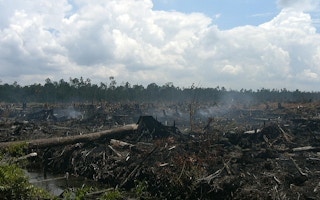Indonesia’s largest oil palm plantation company, Golden Agri-Resources Ltd, will rehabiliate a peatland in Borneo that went up in flames during the recent fire and haze crisis.
And the country’s second-biggest pulp and paper firm, Asia Pacific Resources International Limited, has announced a major new investment in a peat restoration initiative in Sumatra, another epicenter of the burning.
Both projects are billed as first-of-their-kind measures to help Indonesia prevent yet another fire disaster, an annual event exacerbated by this year’s extended dry season brought on by El Niño.
The underlying cause is large-scale draining of peat swamps for oil palm and acacia plantations. Though illegal, companies and farmers often use fire to clear land cheaply, and the dried peat burns uncontrollably.
Like other agribusiness giants, GAR and APRIL have no-burn policies, and both are in the process of implementing pledges to purge their supply chains of peatlands conversion, which the government recently said it would make illegal for everyone.
GAR’s project will focus on one of its concessions in West Kalimantan province. The 2,300-hectare area targeted for rehabilitation experienced significant burning this year. GAR sustainability chief Agus Purnomo attributed the fires to local people who encroached on the area, building canals and starting fires in order to plant the land themselves. If companies don’t set fires themselves, they often have trouble controlling their entire concessions, and disputes with communities over land rights are ubiquitous.
GAR will study the local hydrology and flood areas in need of rewetting before planting endemic species to reforest the peat. The company will also conduct participatory mapping with local communities to establish who owns land where.
“Basically we would like to rehabilitate everything, but it is not up to us entirely,” Agus told Mongabay. “It is also up to the agreement with the local community. If they insist to have activities, we need to find a way to accommodate it somehow.”
The idea is to try to come up with peat-friendly crops that can grow in wetter conditions and provide local people with sources of income. These would exist alongside GAR’s oil palm plantations in the area.
“The only way to make them sign the agreement is to come up with benefits for them in the area,” Agus said. “If it’s an oil palm plantation, they know the benefits they can get. If it’s not going to be palm oil, what would that be? So we need to develop different ways of getting the area benefits to the local community.”
No palm oil company has ever tried to rehabilitate peat like this before, Agus said, adding that the project would assist the government, set an example for the industry and equip GAR with knowledge it can use to manage other areas it has earmarked for conservation.
All told, GAR’s concessions contain nearly 60,000 hectares of undeveloped forest and peatland areas which the company will refrain from converting in line with its ban on deforestation and peat conversion. Another 40,000 hectares remains unplanted. Its total planted land bank is 484,000 hectares, the most of any company.
APRIL’s project centers on the Kampar Peninsula, an enormous swath of peat in fire-prone Riau province that constitutes one of the world’s largest carbon stores and is home to the critically endangered Sumatran tiger (Panthera tigris sumatrae). APRIL promised to spend $100 million over 10 years to double its peat management there from 70,000 hectares to 150,000 hectares. The entire peninsula is 700,000 hectares, around half of which is still forested.
Much of Kampar’s tree cover disappeared into the mills of APRIL and its competitor Asia Pulp & Paper before both corporations pledged to eliminate deforestation from their supply chains recently, according to the World Wildlife Fund (WWF). The new commitment to expand its peat management area “is believed to be the biggest investment by a private sector company in a single eco-restoration project in Indonesia,” APRIL said in a statement.
The 150,000 hectares covered by APRIL’s Riau Ecosystem Restoration (RER) initiative was formerly subject to selective logging by other operators, an APRIL representative told Mongabay. Since 2013, the company has worked with the government to cover the area in ecosystem restoration licenses, which it now manages in conjunction with Flora & Fauna International and local NGO Bidara.
“The partners involved in the RER project hope that it will be a living, working blueprint – an evolving example of what other public and private sector organizations can achieve more broadly through strong partnerships and bold vision,” said Tony Whitten, FFI’s Asia-Pacific director.
While many concessions linked to APRIL’s supply chain experienced heavy burning during the recent disaster, APRIL’s conservation efforts helped Kampar remain “fire free,” according to the company. These efforts entail, first, protecting the area from encroachment, and then planting indigenous tree species and foster the return of wildlife.
“We’d add that this is not drained peatland,” the company said. “While selected logging was undertaken by others in the past, it was not cleared and water levels will be restored with the appropriate action, which is all part of the restoration plan.”










